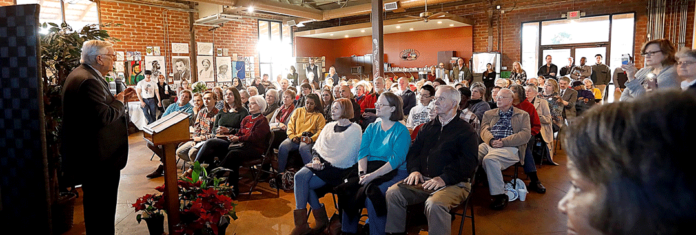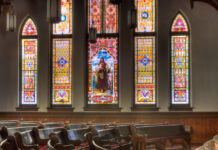

The latest book by Regeneration Writers Press spotlights Macon’s Daybreak Center and the issues surrounding homelessness. “Daybreak: Radical Hospitality in Action” is the 10th published work from the press since its founding on Martin Luther King Jr. Day in 2010 by faculty, students and alumni in Mercer University’s Penfield College.
The hardcover book features life stories, poems, essays and vignettes by leaders, clients and volunteers of the day resource center for the homeless, as well as 10 portraits by 2012 Penfield graduate Yvonne Gabriel. All proceeds from the book are being donated back to Daybreak, a project of Depaul USA.
“It’s beautiful. They did a great job,” said Sister Theresa Sullivan, director of Daybreak. “People talk about the homeless, but people are more than one attribute. (The book) shows the different faces and angles of homelessness. I’m hoping that this book opens people’s hearts and helps them to see … the beauty and potential in each person. Hopefully, it will bring awareness for people to dig deeper and better understand the issues of homelessness.”
The catalyst for the book was a writing class that Sharon McElhaney, book editor and 2016 Penfield graduate, offered to Daybreak clients from October 2014 through 2017. Participants in the weekly Daybreak Writing Group worked on their grammar, punctuation, vocabulary, reading and speaking skills and shared their writings during the meetings, McElhaney said.
McElhaney listened to the clients’ stories and helped them refine and improve their writings, said Dr. Margaret Eskew, editor and president of Regeneration Writers Press and professor of English in Penfield College. Twelve stories in the new book were the product of McElhaney’s class.
“Daybreak is the joy of the early morning after sleeping under bridges and places no one would go,” community member Kikora Chinue wrote in his piece. “Daybreak is the warmth of my shower – the cleansing of my soul, reminding me that I am still the son of God. My heart is touched not to give up, that homelessness is a trial and tribulation.”
Penfield students have volunteered with Daybreak since it opened in 2012. Gabriel said she was a regular volunteer when she started drawing portraits of the people at Daybreak, an activity that helped to facilitate and encourage conversations.
Over the years, Dr. Eskew’s classes have done a substantial amount of research related to the book projects, including looking into the use of copyright materials and fees, books published by working adult students, layout software, indexes for online and print formats, and materials costs.
For the Daybreak book, she taught courses in literature that addressed poverty, housing, prisons, race as a social construct and oppressive education in order to raise her students’ awareness of marginalized people.
Penfield students and alumni researched the history and evolution of homelessness, investigated causes and constructs that contribute to homelessness, compared Macon’s approach to homelessness to other areas, identified areas that need improvement, spent the night in a homeless encampment and connected with Daybreak clients on a personal level, said Jan Crocker, a Penfield College alumna on the book’s editorial team and marketing communications coordinator at Mercer.
Students and alumni have also participated in the editing of all the Regeneration Writers Press books, Dr. Eskew said. For instance, Gabriel wrote and illustrated a children’s book called “Chico,” and class members edited it together.
The editorial teams for the Regeneration Writers Press books have included Penfield College alumni, retired faculty members, current faculty members and current students, as well as other Mercer staff members and community members. Jerome Gratigny, director of academic technology services at Mercer, serves as technical editor for the publishing group, and Gabriel has created the cover artwork for most of the books.

Fittingly, the release party for “Daybreak: Radical Hospitality in Action” was held on Martin Luther King Jr. Day – which marked the 10th anniversary of Regeneration Writers Press – and at Daybreak Center, where Dr. King’s dream is lived out each day. This book project is the result of people of many different colors, backgrounds and talents working together, McElhaney said during the event.
Contributors to the book shared their thoughts on the project with the crowd of about 200. Gabriel and McElhaney signed copies of the book, and attendees enjoyed refreshments. Gabriel’s original portraits featured in the book now are on permanent display in the entry room at Daybreak.
Mercer Chancellor Dr. R. Kirby Godsey, who wrote an essay titled “Homelessness: Finding Pathways of Hope” for the book, delivered the keynote speech for the program.
“There are no unimportant people,” he said. “No one will ever be able to make the difference that you can make. For somebody, you have the power to turn a broken yesterday into a hopeful tomorrow. Light a power of hope. Speak up for the powerless. Together, our voices and our hands can hasten the breaking of that new day.”
Lisa Cannon spoke about how Daybreak provided her with spiritual care and physical support several years ago when she was homeless and struggling with drug addiction. With the organization’s help, she got back on track and has held the same job in management for the past three years.
“I came to Daybreak, and they loved me. It didn’t matter what I looked like. It didn’t matter what I smelled like,” she told the attendees. “I am so thankful for Daybreak. I will always, always be grateful.”
The more than 30 written pieces in “Daybreak: Radical Hospitality in Action” include reflections of tragedy, hardships, growing up, volunteering, working together, poverty misconceptions, the difference one person can make and what makes Daybreak special. The book addresses the issues behind homelessness and the steps to a solution, and the “testimonies and stories literally bring tears to your eyes,” McElhaney said during the event.
“You cannot in one book get so many different voices as you have in here,” Dr. Eskew said. “I love hearing different voices. You see there’s something for everybody in the book.”
Dr. Eskew hopes that all 3,000 printed copies of the book will be sold, so those funds can go back to Daybreak and help the community. McElhaney would like to see the book be the catalyst to create more comprehensive homeless shelters in the future.
Charles Levesque, president and executive director of Depaul USA, said the next step is building more housing for Macon’s most vulnerable population, starting with 33 new units next to Daybreak.
“Daybreak works because it draws on the best of Macon and welcomes the gifts of the individual,” Levesque and Kay Gerhardt of Depaul USA wrote for the book’s back cover. “Daybreak embodies the very formula we need to replicate nationally to end homelessness.”
Want a copy of the book? “Daybreak: Radical Hospitality in Action” can be purchased online from regenerationpress.com and amazon.com (search “Daybreak Regeneration”) or in person at Daybreak and K’s Cleaners and Alterations in Macon. To schedule a book reading at your location, call Dr. Eskew at 478-960-0994.








